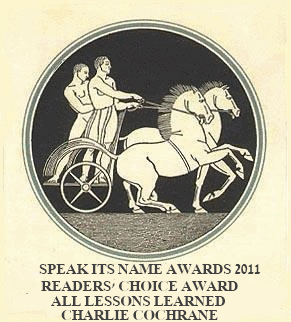 During the Civil War, two young soldiers on opposite sides find themselves drawn together.
During the Civil War, two young soldiers on opposite sides find themselves drawn together.
One man, Ian, is a war-weary but scholarly Southerner who has seen too much bloodshed, especially the tortures inflicted upon the enemy by his vicious, sadistic commanding officer, his uncle.
The other, Drew, is a Herculean Yankee captured by the ragtag Confederate band and forced to become a martyr for all the sins of General Sheridan’s fires.
When these two find themselves admiring more than one another’s spirit and demeanor, when passions erupt between captor and captive, will this new romance survive the arduous trek to Purgatory Mountain?
Lammy-winning author Jeff Mann’s first full-length novel brings two opposed war heroes together in a page-turning historical drama of homomasculine love.
Review by Elliott Mackle
For many Southern Americans, especially those of us descended from generation upon generation of British, Irish, Scots and French forebears, the American Civil War (A.K.A. The War between the States, The War of Northern Aggression, The Late Unpleasantness) is never far from our thoughts. Like a movie within a movie, a looped tape, or parallel reality, the war—its causes and outsize characters, its victories and defeats, the awful aftermath of Reconstruction and segregation—are endlessly replayed, debated, mourned, celebrated and reenacted. It’s almost as if, by turning up new bits of information or reimagining the details of crucial events, we might alter the outcome for the better.
Even today, some of us retain memories of the war. My maternal great grandmother was born in slavery times. Her father, a Confederate officer, was part of the Army of Tennessee that withdrew south prior to the battles of Kennesaw Mountain and Atlanta, and she remembered and later wrote about being a child of the war. When she died in Nashville in 1950, I was in the house, a ten-year-old doorkeeper attending to worried callers. In her last delirium, I was told later, she mourned not two dead husbands, not parents and friends, but the five Confederate generals who died during the Battle of Franklin in 1864. I remember that.
Jeff Mann’s spectacular adventure-romance, Purgatory, creates war-related images and incidents I’d never imagined; characters who may have existed but who, until Dr. Mann conjured them out of history books, fevered dreams, blood-lusty desire and poetical sensibility, never appeared on any printed page, at least that I’m aware of.
The time and place: March 2, 1865, the Battle of Waynesboro, Virginia, and skirmishes thereafter, which will culminate at Appomattox the following month. The result: Confederate Lieutenant General Jubal Early’s forces are destroyed, with many killed and 1,500 captured, by the superior forces, masterful maneuvering and plain good luck of Union Major General Philip Sheridan’s gunners and cavalry divisions. General Early and his staff manage to escape, as do Mann’s fictional, untidy band of about two dozen half-starved volunteers from the Greenbrier country in West Virginia.
Among them soon arrives a lone Yankee prisoner, Drew Conrad, 20, a giant of a man, a Pennsylvania farm boy captured in the ensuing melee by the squad’s cruel, prudish, unbending leader, “Sarge” Erastus Campbell, who happens to be the uncle of the narrator, a bookish, bespectacled and diminutive private named Ian Campbell.
The man’s big and blond. His hands are tied in front of him and tethered to Sarge’s saddle horn. He’s bare-headed, cap lost in some scuffle, I guess, dressed in Union blue and muddy boots, and he’s gasping and stumbling, trying to keep up with the horse’s pace.
Oh, God, not again. A man that young and brawny, that’s the kind of prisoner Sarge tends to keep. I know what’s coming next, and it makes my belly hurt. Sarge has done this before, despite the proper rules of combat. No one in the company’s got the guts to object. Guess they’re afraid if they do, they might end up suffering like the Yankees. Besides, most of them enjoy the spectacle and convenience of a helpless foe to focus their rage on. The war’s been going on for years; despair and exhaustion make men mean.
“Ian! Get over here!” Sarge yells. I lope over just as the Yankee slips in the mud, falls onto one knee, then hits the ground face first.
Sarge, it seems, has a taste for torturing prisoners, a kink his nephew soon discovers in himself. In rapid succession, Ian becomes his brother warrior’s keeper; briefly and only partially unwillingly, his tormentor, and finally his lover.
The love scenes early in the novel are just that: tender explorations of feelings, touch, breath and warmth:
I slide against him, tugging my blanket off the cot to supplement his; I pull the doubled wool over us, tucking it around his bare shoulders. Then I do what I’ve ached to do for days: I slide one arm beneath his neck, wrap the other around his bare torso as best I can, considering my significantly smaller frame, and hold him close, his broad back pressed against my uniform jacket. Surely he can feel the physical evidence of my excitement against him, hard inside my wool pants, but, if so, he makes no objections, and besides, it’s my heart and not my groin that rules tonight. As much as I want to make love to him, it’s comforting, not fucking, he’s asked for, and that’s what he’ll receive. I may be an accomplice to torture but I still have some honor left.
The narrative line is a tale of retreat, survival, hardship and last-minute escapes punctuated by scrapes, repeated torture of the unfortunate Yankee, and stealing, begging and bargaining for food.
One of the most memorable images is that of an attractive young female trader who transports hams, coffee, fried pies, beef jerky and other comestibles under her voluminous skirts.
Food plays a big part in the novel. For men living out in the open, a hoecake or biscuit and a slice of warm bacon might be the difference between starvation and carrying on another day. When supplies run low, the soldiers are forced to consume such dainties as roasted rat with peanut sauce and weevil-infested hardtack. Dr. Mann’s well-known interest in traditional Appalachian fare gives the novel a kind of edible sub-plot. Among the sources listed in the bibliography, cookbooks and culinary histories far outnumber the works devoted to sex and everyday military life. Not surprisingly, the only other sympathetic male characters in the novel, besides Ian and Drew, are Rufus, the cook, and Jeremiah, a soldier whose brother left home after being caught kissing another man. Against the orders of Sarge, they conspire with Ian to share enough food and drink to keep the prisoner alive.
Sarge, whose wife was shot and killed by a Yankee soldier, seems to believe this loss gives him a pass to massacre the Union Army—one captive at a time. Drew, Ian explains to his prisoner, is one of a succession.
“Sarge has his fun for two or three weeks, till the prisoner dies on him after such steady abuse, or till Sarge gets bored and murders him. I’m in charge of them while they last. I keep them tied, I feed them, I mend them as best I can for Sarge to beat on and break down again. And eventually, I bury them.”
Sarge, in other words is a coward and petty tyrant with no further interest in facing the enemy. On several occasions he and his men hide behind trees and rocks, silent and still, as figures such as George Custer and Philip Sheridan ride by. Might a few choice shots, even then, have changed the course of the war? Probably not, but Sarge is unwilling to risk his own skin even on that faint chance. His excuse? That he’s shepherding his ragtag band toward Petersburg, there to join forces with the larger army for the ultimate battle that may turn the tide of history.
That he spends considerably less time traveling than attending church, drinking whiskey and torturing Drew gives lie to his stated intention.
The varieties of torture are manifold. Drew is whipped with Ian’s leather belt and Sarge’s bullwhip. He is strung from a branch, tied to a tree and “bucked”—bent over a sawhorse and tied to it. He is kicked, punched, slapped, pissed on, spat on and insulted verbally and physically.
On at least three occasions, Weasel-Tooth George, the most repellant of Sarge’s men, proposes to “poke” the gagged prisoner’s naked, bleeding ass as further proof of Confederate scorn. Here Sarge draws the line. Ian, a bit later, does indeed poke his by-then willing lover, albeit under very different circumstances. There are no complaints.
Drew is presented as herculean, a giant rippling with muscles, an Achilles. And yet he has a softer side:
“I didn’t take it. I cried when your uncle whipped me and I cried when I was bucked. I break easy, Ian.” Drew’s voice is low, shaky. “I may look strong, but I’ve got this scared little boy inside me. His tears shame me again and again.”
From what I know of Dr. Mann, both as an admirer of his work and as a fellow laborer in the garden of Southern fiction, it’s clear that Drew is here speaking in the author’s voice. Purgatory is a celebration of much that not only fascinates but drives the author: bondage and submission, the eroticization of pain, mountain men living the outdoor life, traditional food well prepared and enjoyed, the love of one man for another, and the quest for the precisely right word or phrase.
Full disclosure: bondage and pain hold little interest for me. Culinary matters, military adventure, manly love and good writing, on the other hand, define much of my own life and work. Were Purgatory merely a succession of torture scenes interposed with stealthy hand-feedings of the captive, I wouldn’t bother with it.
Mann, however, has more in mind than mere flesh, blood and spit-roasted rabbit. Drew is presented early and often as a Christ figure. Toward the end, he is forced to march carrying a thick branch tied across his shoulders and outstretched arms:
Drew’s brow furrows. He grunts, tries to rise, sags beneath the wood’s weight, then, heaving himself to his feet, straightens up, white teeth gnashing the rag and grim determination stiffening his features.
With this image of the suffering innocent stumbling toward Golgotha (Purgatory the place is in reality Purgatory Mountain, Virginia), the reference is clear enough, as it is in soaring earlier images such as this:
If Drew’s torment reminded me of Christ’s before, it does even more so today. During his week of captivity, his beard has filled out and his hair has grown shaggier. He’s like a German-blond version of Jesus. This morning he’s white, bruise-violet, and gold, a cuffed, rag-gagged, black-eyed savior wrist-tethered to my cart, trudging beside me along the road to Purgatory. He’s naked, save for slave-collar, layered bandages—those with which I’ve plastered his lash-maimed back, those which I’ve knotted into a makeshift loincloth around his hips—and a spare undershirt I’ve torn into pieces and bound about his feet. All that are missing are the crown of thorns and the Cross. Or rather, those take another form, the racked and bruised body he carries stiffly down the road.
Mann’s writing combines elegance and earthiness in realistic passages that move the action along swiftly and dramatically. A professor at Virginia Tech, Mann has taught such courses as Appalachian folk culture, gay and lesbian literature and creative writing. His familiarity with Southern history and American lit enrich and color the narrative. Whether intended or not, the cast of characters recalls that of Melville’s Billy Budd, with Drew the Billy-Christ martyr figure, George the repressed Claggart and Sarge an unreflecting Captain Vere. The novel’s last page, in which the lovers try to imagine the future, calls to mind nothing less than Prior Walter’s blessing in the final scene of Tony Kushner’s Angels in America.
Still, Dr. Mann didn’t quite convince me to suspend my disbelief in the possibility that even a strong young man could be kept on the edge of starvation, forced to sleep naked in the snow, marched mile after mile tied to a cart and whipped into bloody insensibility on an almost daily basis—and walk away from it so easily. Occasionally, the succession of BDSM incidents reminded me of the kind of porn in which each of the partners enjoys five or six explosive ejaculations and then, after a few hours’ sleep, repeat the exercise. Could happen; feels improbable to me.
As does some of the language. Despite his book-learning, it seems doubtful that Ian would know and correctly use the word “trauma.” It’s just possible he might be on familiar terms with Whitman’s Leaves of Grass.
No matter. For lovers of gay historical fiction, fans of BDSM action and open-minded students of the Civil War, Purgatory is required reading.
Author’s Website
Buy at: Amazon UK Amazon USA (available in paperback and ebook)
(Bear Bones Books is an arm of Lethe Press dealing with Bear Fiction)
Filed under: America, American Civil War, Essential Reads, Fiction, five stars, Jeff Mann, Reviews, War | 4 Comments »






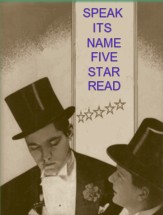
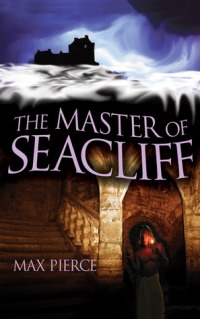 It is 1899, and young Andrew Wyndham has accepted a position tutoring the unruly son of wealthy industrialist Duncan Stewart in the hopes that the work will be brief yet provide an avenue to pay for his passage to France to study art. But Seacliff is a dark and eerie mansion enshrouded in near-eternal fog, dark mystery and suspicion-perhaps a reflection of the house’s master. An imposing Blackbeard of a man, brooding Duncan Stewart is both feared and admired by his business associates as well as the people he calls friends, for Stewart may have murdered his own father to gain control of his business.And his home, in which Andrew Wyndham must now reside, holds terrible secrets-secrets that could destroy everyone within its walls.
It is 1899, and young Andrew Wyndham has accepted a position tutoring the unruly son of wealthy industrialist Duncan Stewart in the hopes that the work will be brief yet provide an avenue to pay for his passage to France to study art. But Seacliff is a dark and eerie mansion enshrouded in near-eternal fog, dark mystery and suspicion-perhaps a reflection of the house’s master. An imposing Blackbeard of a man, brooding Duncan Stewart is both feared and admired by his business associates as well as the people he calls friends, for Stewart may have murdered his own father to gain control of his business.And his home, in which Andrew Wyndham must now reside, holds terrible secrets-secrets that could destroy everyone within its walls.  The year is 68 CE. Led by the fanatical Sicarii, the ideological dagger men, Jews seize Jerusalem, execute the Roman garrison, and begin to cleanse Judaea of all impurities and foreign influences, including Greek love. Nero sends Vespasianus with three legions to quell the revolt. Caught in this conflict is the Sacred Community of Men, whose leader is the man who was Jesus’ lover, and Joanna, in whose home was held the Last Supper with Jesus. To escape assassination, Jesus’ beloved flees Judaea for cosmopolitan Alexandria, where he has been accepted as a Visiting Scholar in the famous Temple of the Muses, the Mouseion. Within days of arriving in the city, fierce ethnic fighting breaks out between Greeks and Jews, disrupting his life and plans. Further complicating his life is Markos, the sexy, wealthy young Greek, who wants a relationship with him, Hakor, the young orphaned Egyptian boy whom he befriends, and Diokles, Director of Visiting Scholars, who takes more than an intellectual interest in him. He senses he is being followed without being able to identify by whom. When he and his friends are viciously attacked, they discover the Sicarii have him marked for assassination. Finally, to end the chaos, Tiberius Alexander, Governor of Egypt, recalls the legion from fighting bandits in the south of Egypt. As they attack the quarter, our hero is trapped and comes face to face with a Roman centurion with drawn bloody sword eager to kill. Will he survive?
The year is 68 CE. Led by the fanatical Sicarii, the ideological dagger men, Jews seize Jerusalem, execute the Roman garrison, and begin to cleanse Judaea of all impurities and foreign influences, including Greek love. Nero sends Vespasianus with three legions to quell the revolt. Caught in this conflict is the Sacred Community of Men, whose leader is the man who was Jesus’ lover, and Joanna, in whose home was held the Last Supper with Jesus. To escape assassination, Jesus’ beloved flees Judaea for cosmopolitan Alexandria, where he has been accepted as a Visiting Scholar in the famous Temple of the Muses, the Mouseion. Within days of arriving in the city, fierce ethnic fighting breaks out between Greeks and Jews, disrupting his life and plans. Further complicating his life is Markos, the sexy, wealthy young Greek, who wants a relationship with him, Hakor, the young orphaned Egyptian boy whom he befriends, and Diokles, Director of Visiting Scholars, who takes more than an intellectual interest in him. He senses he is being followed without being able to identify by whom. When he and his friends are viciously attacked, they discover the Sicarii have him marked for assassination. Finally, to end the chaos, Tiberius Alexander, Governor of Egypt, recalls the legion from fighting bandits in the south of Egypt. As they attack the quarter, our hero is trapped and comes face to face with a Roman centurion with drawn bloody sword eager to kill. Will he survive?
 Lord Edwin Nash has been sent to London by his father, threatened with disinheritance unless he finds a wife. Lord Thomas Downe sees through the mask Edwin presents to the world and leaves Edwin powerless to deny his love.
Lord Edwin Nash has been sent to London by his father, threatened with disinheritance unless he finds a wife. Lord Thomas Downe sees through the mask Edwin presents to the world and leaves Edwin powerless to deny his love. Painfully introverted and rendered nearly mute by a heavy stammer, Lord George Albert Westin rarely ventures any farther than the club or his beloved gardens. When he hears rumors of an exotic new orchid sighted at a local hobbyist’s house, though, he girds himself with opiates and determination to attend a house party, hoping to sneak a peek.
Painfully introverted and rendered nearly mute by a heavy stammer, Lord George Albert Westin rarely ventures any farther than the club or his beloved gardens. When he hears rumors of an exotic new orchid sighted at a local hobbyist’s house, though, he girds himself with opiates and determination to attend a house party, hoping to sneak a peek.
 Alexander Norton loathes the festive season. The revelry of the ton is a reminder of Christmas four years ago, when his first love, Thomas Bennett, broke his heart and fled to New York without a word. So when he encounters Thomas at a holiday ball, Alexander is determined not to let on how much he still hurts.
Alexander Norton loathes the festive season. The revelry of the ton is a reminder of Christmas four years ago, when his first love, Thomas Bennett, broke his heart and fled to New York without a word. So when he encounters Thomas at a holiday ball, Alexander is determined not to let on how much he still hurts. Rag & Bone is #2 in the Inspector Raft Mystery Series.
Rag & Bone is #2 in the Inspector Raft Mystery Series. It is 1963. Being gay is a sin against God. And twenty-eight year old mechanic Will meets Bran for the first time.
It is 1963. Being gay is a sin against God. And twenty-eight year old mechanic Will meets Bran for the first time. Book one in the Past Perfect Series
Book one in the Past Perfect Series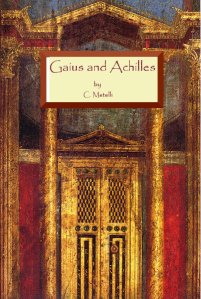
 Bruce Shannon is a Private Investigator dealing with case after case of missing persons and infidelity. None of which inspire warm, fuzzy feelings during the week of Valentine’s Day. Then again, Bruce isn’t exactly a fuzzy feelings kind of guy, which suits him just fine. He doesn’t need anyone anyhow, only his cat, Mittens.
Bruce Shannon is a Private Investigator dealing with case after case of missing persons and infidelity. None of which inspire warm, fuzzy feelings during the week of Valentine’s Day. Then again, Bruce isn’t exactly a fuzzy feelings kind of guy, which suits him just fine. He doesn’t need anyone anyhow, only his cat, Mittens.  Can two men build a relationship when one must tear down each stone that the other has worked so hard to build?
Can two men build a relationship when one must tear down each stone that the other has worked so hard to build? 
 Orphaned as a boy and brought up by the crusty, disapproving Edward Collins, Dr. David Jameson may not know much about love, but he makes up for it with an encyclopedic knowledge of Egyptian history and language. Too bad his job as linguist for a team excavating in the Valley of the Kings puts him right under Edward’s nose. When the discovery of a rare artifact leads to a disagreement between guardian and ward, Jeremiah McKee, the team’s American benefactor, sends no-nonsense Jake Tanner to protect his investment.
Orphaned as a boy and brought up by the crusty, disapproving Edward Collins, Dr. David Jameson may not know much about love, but he makes up for it with an encyclopedic knowledge of Egyptian history and language. Too bad his job as linguist for a team excavating in the Valley of the Kings puts him right under Edward’s nose. When the discovery of a rare artifact leads to a disagreement between guardian and ward, Jeremiah McKee, the team’s American benefactor, sends no-nonsense Jake Tanner to protect his investment. Ragnar, a hardened Scottish soldier, is indifferent to English rule of his homeland until he falls in love with Gylis McIvoy, a fellow Scotsman. They have a brief and passionate affair, but circumstances tear them apart permanently. Ragnar swears vengeance, and soon becomes a freedom fighter modeled on the recently captured and executed William Wallace.
Ragnar, a hardened Scottish soldier, is indifferent to English rule of his homeland until he falls in love with Gylis McIvoy, a fellow Scotsman. They have a brief and passionate affair, but circumstances tear them apart permanently. Ragnar swears vengeance, and soon becomes a freedom fighter modeled on the recently captured and executed William Wallace. ‘… The accounts of these cases are too bound up with events in my personal life which, although they may provide a plausible commentary to much of my dealings with Mr Sherlock Holmes, can never be made public while he or I remain alive …’
‘… The accounts of these cases are too bound up with events in my personal life which, although they may provide a plausible commentary to much of my dealings with Mr Sherlock Holmes, can never be made public while he or I remain alive …’ Phillip Froelich and Tim Danelaw are irresistibly drawn to each other. Both are in every obvious respect what is generally considered masculine, and live and work in a completely normal man’s social and professional world. Other men respect and admire their courage and ability and even their physical prowess. Women are very much attracted to both of them.
Phillip Froelich and Tim Danelaw are irresistibly drawn to each other. Both are in every obvious respect what is generally considered masculine, and live and work in a completely normal man’s social and professional world. Other men respect and admire their courage and ability and even their physical prowess. Women are very much attracted to both of them.  Ahoy, me proud beauty, shiver me timbers! I ask ye to sail me jollyboat on the high seas, lubber, but will ye dare to accept? On offer be a pirate’s life full of danger and risk, and not just to yer neck, but to yer very virgin heart! There’s many a bodice to be ripped–or perhaps I should say many a codpiece to be snapped–and should ye be graced enough to cross bones with a corsair, don’t be an addlepate! Heave ho, lad, handsomely, and show him how ye bury yer treasure!
Ahoy, me proud beauty, shiver me timbers! I ask ye to sail me jollyboat on the high seas, lubber, but will ye dare to accept? On offer be a pirate’s life full of danger and risk, and not just to yer neck, but to yer very virgin heart! There’s many a bodice to be ripped–or perhaps I should say many a codpiece to be snapped–and should ye be graced enough to cross bones with a corsair, don’t be an addlepate! Heave ho, lad, handsomely, and show him how ye bury yer treasure! From the Lambda Literary Award and Bram Stoker Award-winning author Lee Thomas come a new thrilling novel. 1944 – Barnard, Texas. At the height of World War II, a killer preys on the young men of a quiet Texas town. The murders are calculated, vicious, and they are just beginning. Sheriff Tom Rabbit and his men are baffled and the community he serves is terrified of the monster lurking their streets. The only clues the killer leaves behind are painted snuffboxes containing notes written in German. As the panic builds all eyes turn toward a quiet man with secrets of his own. Ernst Lang fled Germany in 1934. Once a brute, a soldier, a leader of the Nazi party, he has renounced aggression and embraces a peaceful obscurity. But Lang is haunted by an impossible past. He remembers his own execution and the extremes of sex and violence that led to it. He remembers the men he led into battle, the men he seduced, and the men who betrayed him. But are these the memories of a man given a second life, or the delusions of a lunatic?
From the Lambda Literary Award and Bram Stoker Award-winning author Lee Thomas come a new thrilling novel. 1944 – Barnard, Texas. At the height of World War II, a killer preys on the young men of a quiet Texas town. The murders are calculated, vicious, and they are just beginning. Sheriff Tom Rabbit and his men are baffled and the community he serves is terrified of the monster lurking their streets. The only clues the killer leaves behind are painted snuffboxes containing notes written in German. As the panic builds all eyes turn toward a quiet man with secrets of his own. Ernst Lang fled Germany in 1934. Once a brute, a soldier, a leader of the Nazi party, he has renounced aggression and embraces a peaceful obscurity. But Lang is haunted by an impossible past. He remembers his own execution and the extremes of sex and violence that led to it. He remembers the men he led into battle, the men he seduced, and the men who betrayed him. But are these the memories of a man given a second life, or the delusions of a lunatic?
 At 6 years old, long before he discovers that he is gay, Banat Frantz learns that being Jewish in Hitler’s Germany is a bewildering crime for which he and his family must pay. Fire and loathing greet his emerging consciousness and a resourceful child begins to learn survival skills. Violently forced from their home and a successful business, his family immigrates to Holland but discover that they haven’t traveled far enough. They realize too late that Hitler’s mania would spread across a continent. The Nazis wrench the family apart, tossing them into the maw of the holocaust where only survival matters. Even in places where humanity itself chokes on the ashes of hatred, Banat realizes that he is gay and has fallen in love with another young Jew. The knowledge shapes his existence as he copes with the relentless horror of his life in a series of ever-more grim and nightmarish places until he finds himself in the hushed and gray world of Auschwitz, where silent screams fill every mind. But nothing can truly kill the spirit if it is filled with a longing for beauty. A young man of such sensibilities can forge moments of sublime bliss in whatever setting he encounters, and through a network of Jewish actors, writers, singers and intellectuals he learns that art can shelter his passions and that his very longing is his refuge. From his earliest memories of Nazi rallies that unleashed teeming hatred, to his redemption in a New York gay club, Banat Frantz lives an entire life before it ever really begins.
At 6 years old, long before he discovers that he is gay, Banat Frantz learns that being Jewish in Hitler’s Germany is a bewildering crime for which he and his family must pay. Fire and loathing greet his emerging consciousness and a resourceful child begins to learn survival skills. Violently forced from their home and a successful business, his family immigrates to Holland but discover that they haven’t traveled far enough. They realize too late that Hitler’s mania would spread across a continent. The Nazis wrench the family apart, tossing them into the maw of the holocaust where only survival matters. Even in places where humanity itself chokes on the ashes of hatred, Banat realizes that he is gay and has fallen in love with another young Jew. The knowledge shapes his existence as he copes with the relentless horror of his life in a series of ever-more grim and nightmarish places until he finds himself in the hushed and gray world of Auschwitz, where silent screams fill every mind. But nothing can truly kill the spirit if it is filled with a longing for beauty. A young man of such sensibilities can forge moments of sublime bliss in whatever setting he encounters, and through a network of Jewish actors, writers, singers and intellectuals he learns that art can shelter his passions and that his very longing is his refuge. From his earliest memories of Nazi rallies that unleashed teeming hatred, to his redemption in a New York gay club, Banat Frantz lives an entire life before it ever really begins.


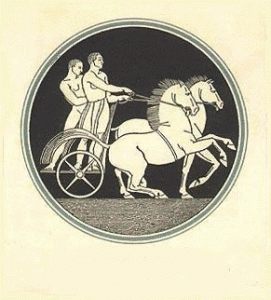
 Resoundingly goes to
Resoundingly goes to 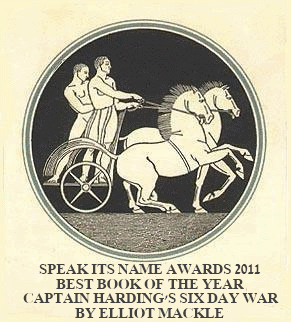








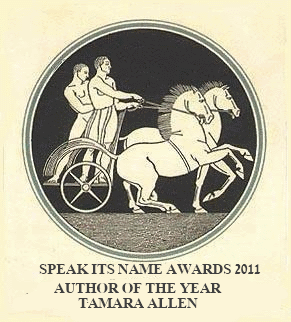
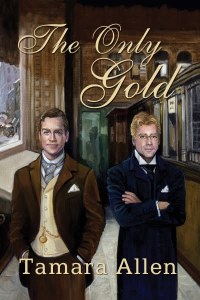 However, out of all the books I reviewed
However, out of all the books I reviewed 
